Module 7 My past life Unit 3 Language in use 课件(共32张PPT)
文档属性
| 名称 | Module 7 My past life Unit 3 Language in use 课件(共32张PPT) | 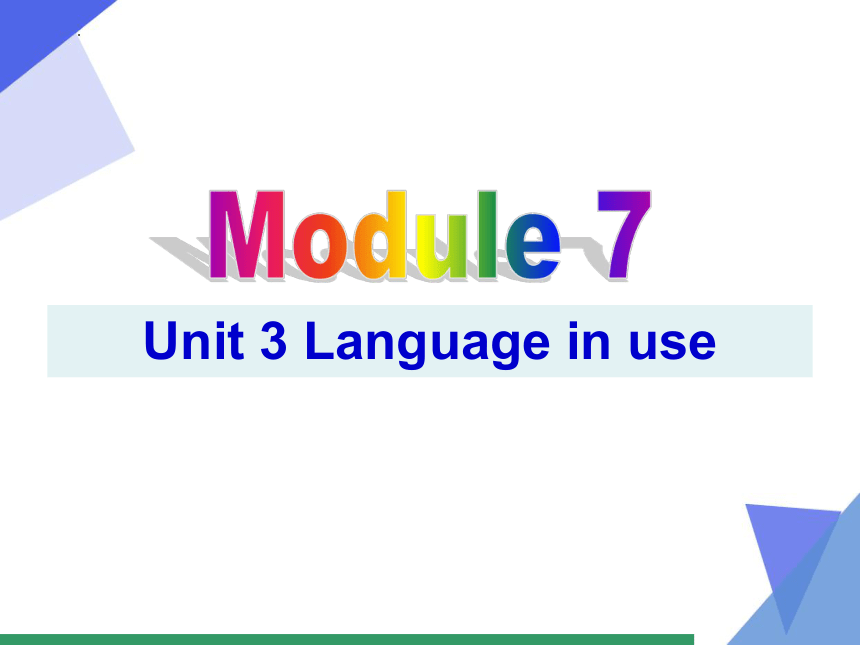 | |
| 格式 | zip | ||
| 文件大小 | 5.9MB | ||
| 资源类型 | 教案 | ||
| 版本资源 | 外研版 | ||
| 科目 | 英语 | ||
| 更新时间 | 2023-04-21 19:58:10 | ||
图片预览

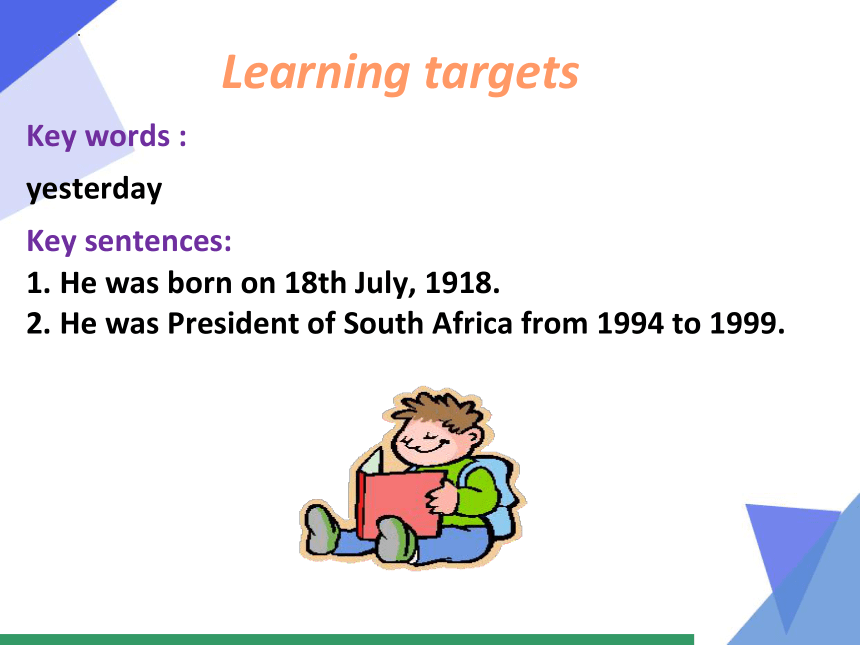
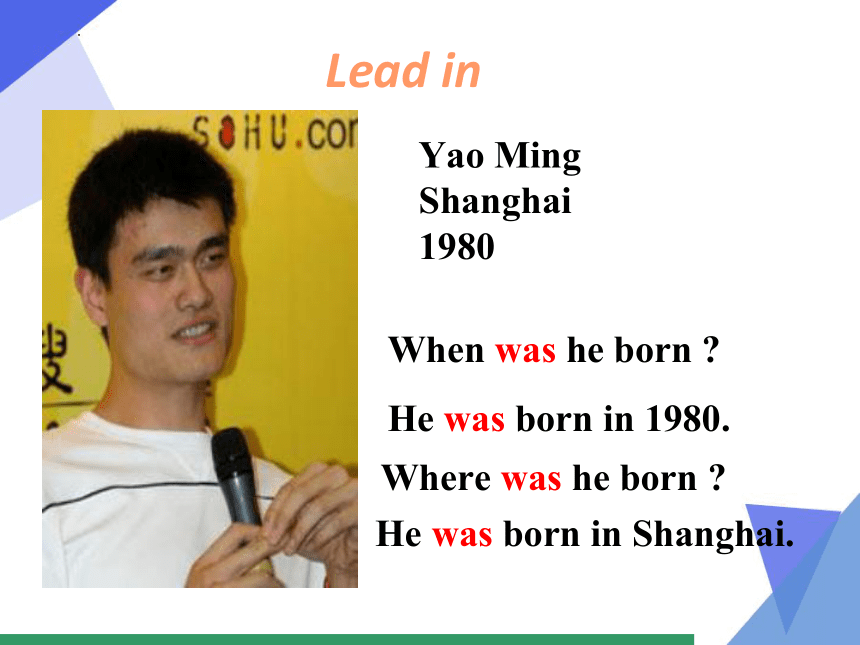
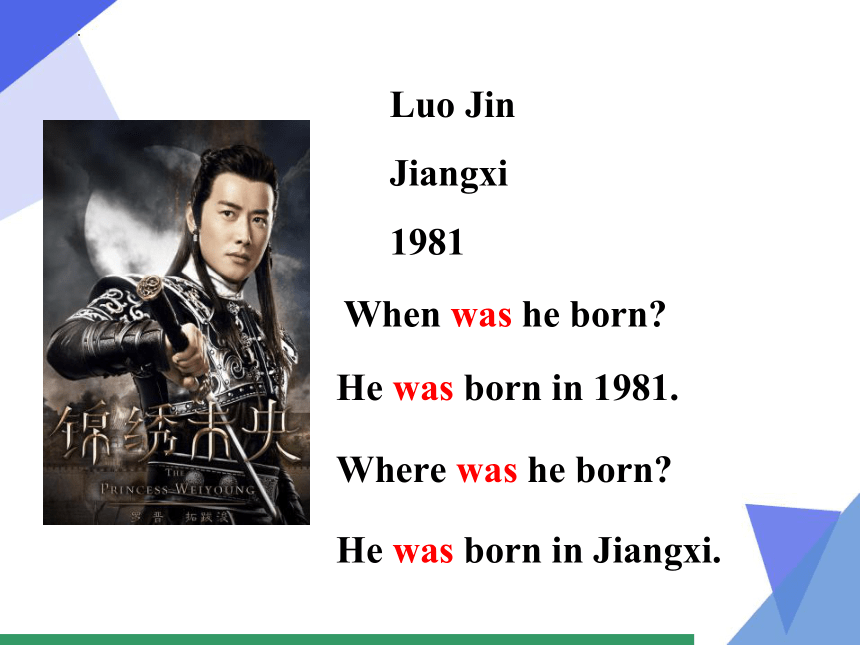

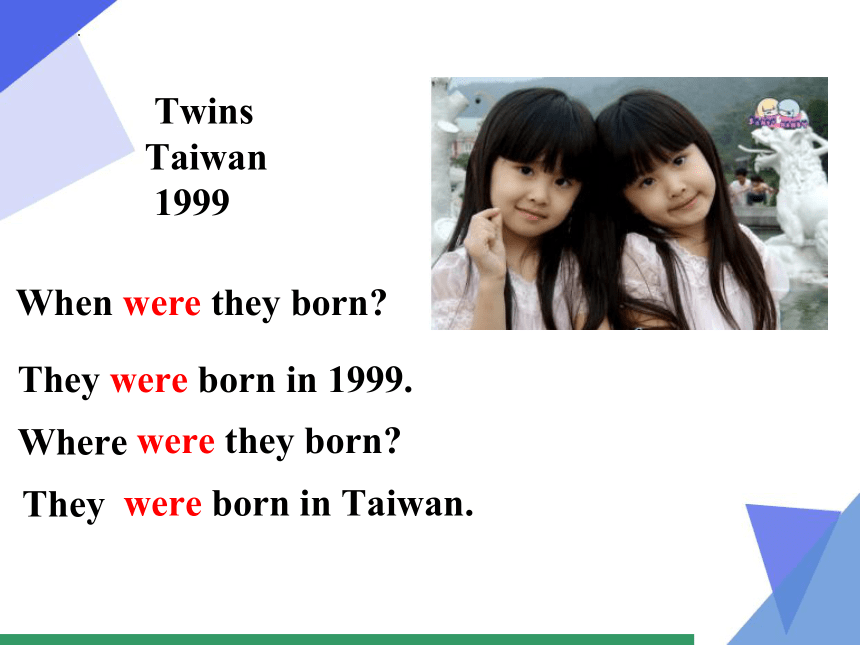
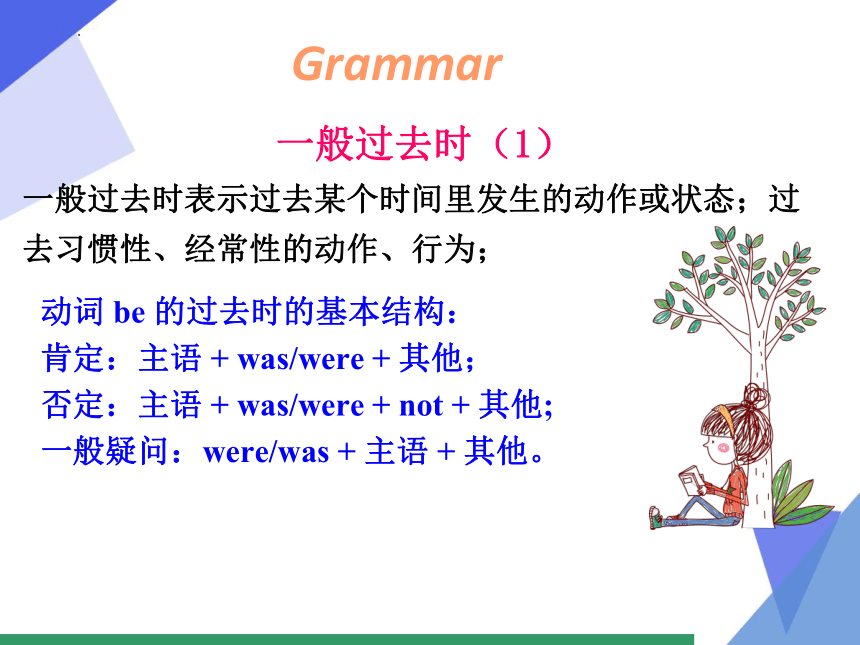
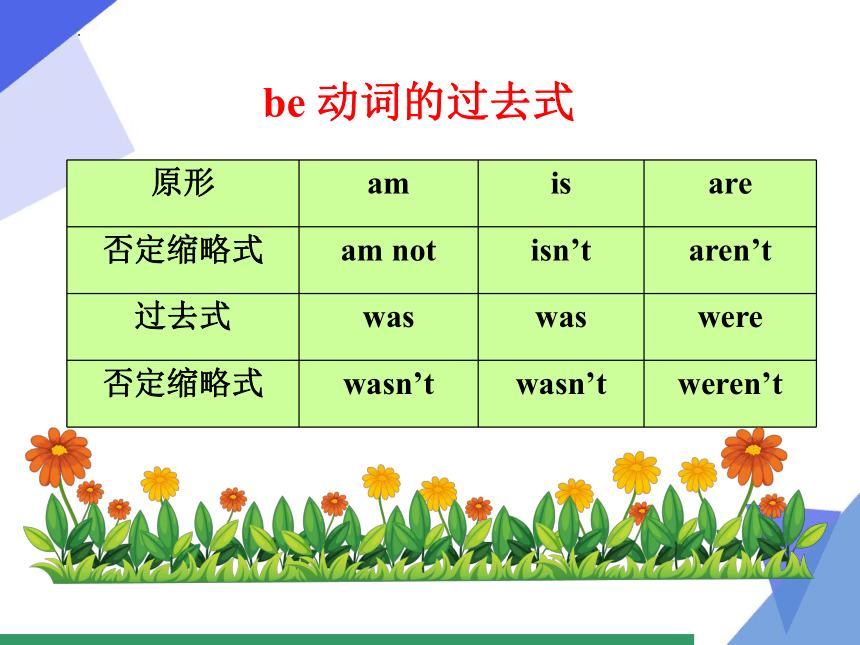
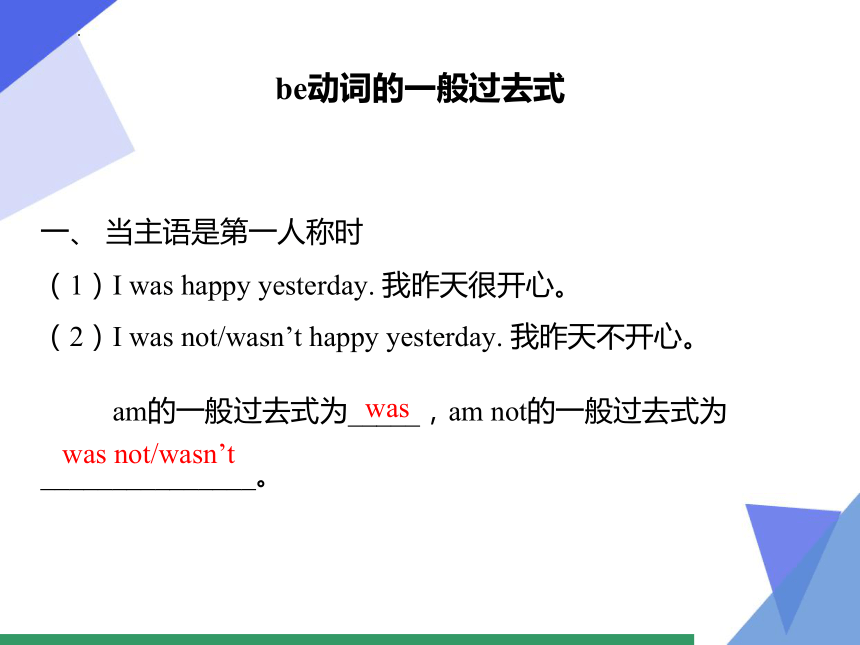
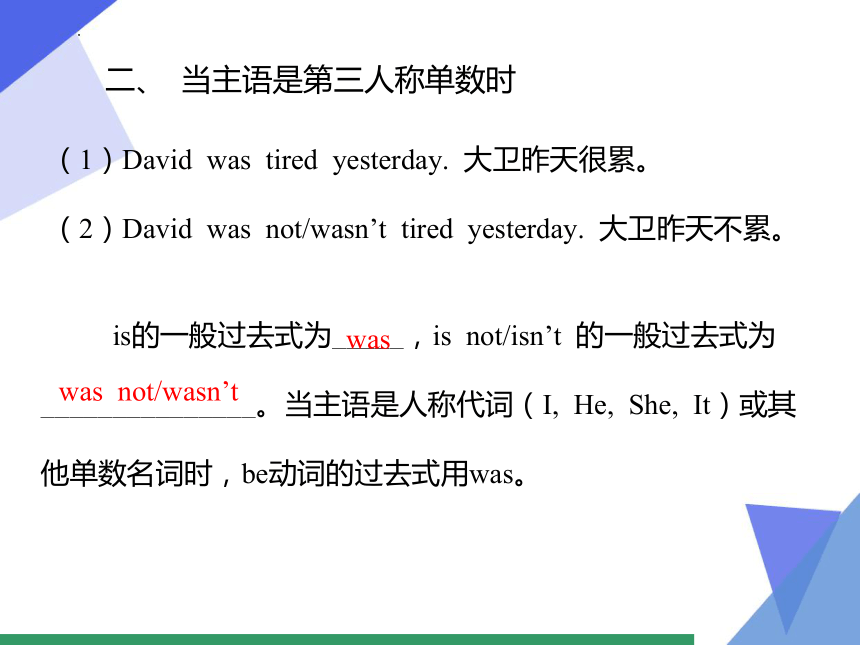
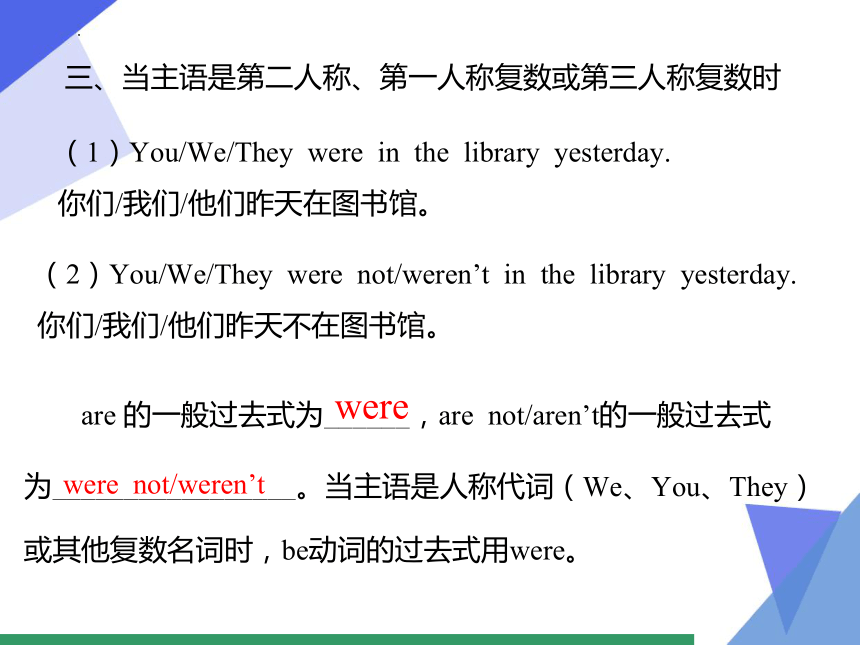
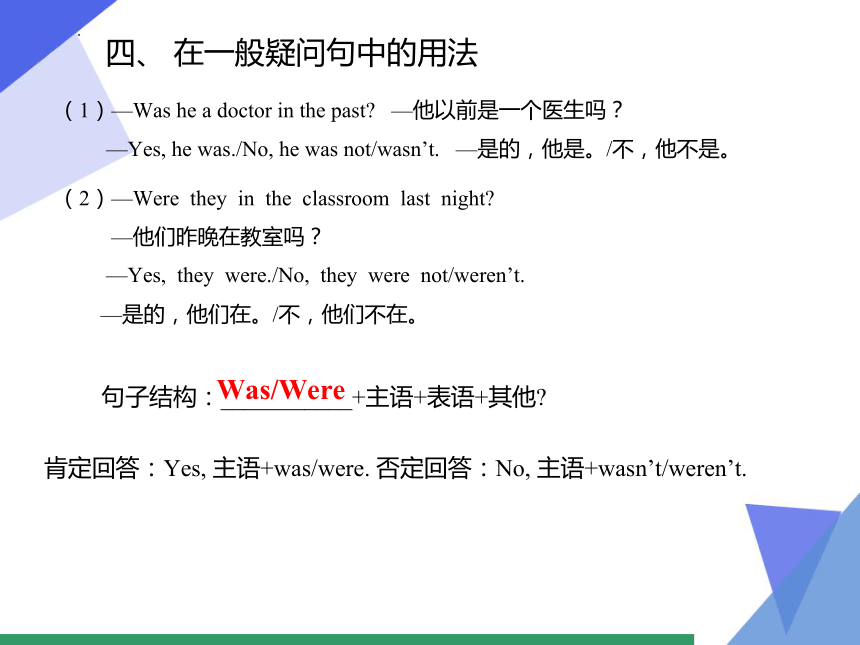
文档简介
(共32张PPT)
Module 7
Unit 3 Language in use
Key words :
yesterday
Key sentences:
1. He was born on 18th July, 1918.
2. He was President of South Africa from 1994 to 1999.
Learning targets
He was born in Shanghai.
Yao Ming
Shanghai
1980
He was born in 1980.
When was he born
Where was he born
Lead in
Luo Jin
Jiangxi
1981
When was he born
He was born in 1981.
Where was he born
He was born in Jiangxi.
Zheng Shuang
Liaoning
1991
When was she born
She was born in 1991.
Where was she born
She was born in Liaoning Province.
When were they born
They were born in 1999.
Where
They
Twins
Taiwan
1999
were they born
were born in Taiwan.
一般过去时(1)
一般过去时表示过去某个时间里发生的动作或状态;过去习惯性、经常性的动作、行为;
动词 be 的过去时的基本结构:
肯定:主语 + was/were + 其他;
否定:主语 + was/were + not + 其他;
一般疑问:were/was + 主语 + 其他。
Grammar
be 动词的过去式
原形 am is are
否定缩略式 am not isn’t aren’t
过去式 was was were
否定缩略式 wasn’t wasn’t weren’t
be动词的一般过去式
一、 当主语是第一人称时
(1)I was happy yesterday. 我昨天很开心。
(2)I was not/wasn’t happy yesterday. 我昨天不开心。
am的一般过去式为_____,am not的一般过去式为
_______________。
was
was not/wasn’t
二、 当主语是第三人称单数时
(1)David was tired yesterday. 大卫昨天很累。
(2)David was not/wasn’t tired yesterday. 大卫昨天不累。
is的一般过去式为_____,is not/isn’t 的一般过去式为
_______________。当主语是人称代词(I, He, She, It)或其
他单数名词时,be动词的过去式用was。
was
was not/wasn’t
三、当主语是第二人称、第一人称复数或第三人称复数时
(1)You/We/They were in the library yesterday.
你们/我们/他们昨天在图书馆。
(2)You/We/They were not/weren’t in the library yesterday. 你们/我们/他们昨天不在图书馆。
are 的一般过去式为______,are not/aren’t的一般过去式
为_________________。当主语是人称代词(We、You、They)
或其他复数名词时,be动词的过去式用were。
were
were not/weren’t
四、 在一般疑问句中的用法
(1)—Was he a doctor in the past —他以前是一个医生吗?
—Yes, he was./No, he was not/wasn’t. —是的,他是。/不,他不是。
(2)—Were they in the classroom last night
—他们昨晚在教室吗?
—Yes, they were./No, they were not/weren’t.
—是的,他们在。/不,他们不在。
句子结构:___________+主语+表语+其他
肯定回答:Yes, 主语+was/were. 否定回答:No, 主语+wasn’t/weren’t.
Was/Were
五、 在特殊疑问句中的用法
(1)Where were you born
你在哪里出生?
(2)Why was he in the museum yesterday
他昨天为什么在博物馆?
句子结构:特殊疑问词(Why/Where/What/When…)
+__________ +主语+表语+其他
was/were
学习动词 be 的一般过去时,下面有一口诀,它可以帮大家更好地掌握动词 be 的一般过去时。
动词 be 的过去时有四巧:
一是时间状语巧,表示过去的短语要记牢;
二是形式巧,单数 was,复数 were;
否定句结构是三巧,not 紧跟was/were;
四是疑问句式巧, was/were 向前跑(提前)。
【一巧】 时间状语巧。
一般过去时表示过去发生的动作或存在的状态,恰巧与表示过去的一些时间状语连用。例如:yesterday, last night/week/month/year, last Saturday, the day before yesterday, in 1998, five years ago 等。
【二巧】 形式巧。
它与一般现在时一样,形式多样:当主语是第一人称单数或第三人称单数时,谓语动词用 was;主语是第二人称或其他人称复数时,谓语动词用 were。
例如:I was in the classroom yesterday morning.
昨天早上我在教室里。
They were at school last Tuesday.
上周二他们在学校。
【三巧】 否定句结构巧。
与动词 be的一般现在时一样,它在动词后面加 not 即可变成否定句,并且 was, were 与 not 可以缩写成 wasn’t, weren’t。
即:主语 + wasn’t/ weren’t + 表语 + 其他。
例如:
I was not (=wasn’t) here yesterday.
昨天我不在这儿。
【四巧】 疑问句式巧。
把 was, were 提到句首,句末用问号即可变为一般疑问句。即:Was (Were) + 主语 + 表语 + 其他?这恰巧与动词 be 的一般现在时的疑问句式相似
例如:
Were you at home the day before yesterday
前天你在家吗?
Was she late this morning?
今天早上她迟到了吗?
更巧的是疑问句的答语也相似,肯定回答用“Yes, 主语 + was/were.”;否定回答用“No, 主语 + wasn’t/weren’t.”。
Complete the sentences with the correct form of be.
1. Lingling ______ (not) here last weekend.
She ______ in Xucun.
2. —_____ Tony born in Cambridge
—Yes, he _____.
3. — ______ Daming born in Beijing.
—Yes, he ______.
4. —_______ they at school on Monday
—No, they _______.
wasn’t
was
Was
was
Was
was
Were
weren’t
5. —_______ they at home this morning
—No, they _______.
6. —_______ your first teacher strict
—Yes, she ______.
7. — _______ your friends at your first school difficult.
—No, they _______.
8. —_______ you happy at your first
school
—Yes, I ________.
Were
weren’t
Was
was
Were
weren’t
Were
was
Complete the sentences with the correct form of the word and expressions from the box.
be bored be born on the east coast of lots of primary school town
1. I was a good pupil in _______________.
2. — Where ______ you _______
— In Newton, a small _______ inAmerica.
primary school
were
born
town
3. — Can I play a computer game, Mum
I _________.
— You can read your book.
4. Qingdao is in Shangdong Province and
it is __________________ China.
5. There was a new film on yesterday and
there were _______ people at the cinema.
am bored
on the east coast of
lots of
Hero of South Africa
Nelson Mandela was born in a small
village in the Transkei region of South Africa. He was born on 18th July,
1918. He was President of South
Africa from 1994 to 1999.
Around the world
Writing about your classmate’s past life.
Module task:Module task:
Work in pairs. Talk about your past life with your classmate.
—When were you born
— I was born…
Write about your classmate’s past life.
He/She was born…
5
6
Write about your classmate’s past life.
He/She was born_________________________
__________________________________________
__________________________________________
__________________________________________
__________________________________________
__________________________________________
__________________________________________
__________________________________________
Possible answer:
She was born in Beijing in 1996. She lived in a house with a small garden. Her bedroom had posters of film stars on the walls. She went to Beijing Yumin Primary School and was very happy there. Her favourite classes were art and music. The teachers were very friendly. Her favourite teacher was Mrs Wang because she was strict but very nice. Her best friend was Li Fei. She was very good in class.
1.Hero of South Africa
(1)hero为可数名词,意为“英雄”,其复数形式为heroes。
They are the heroes of our time.
他们是我们这个时代的英雄。
(2)Africa为名词,意为“非洲”。
There are many giraffes in Africa. 非洲有很多长颈鹿。
Language points
2.He was born on 18th July,1918.
在英语中,“某年某月某日”可以表示为“日期+月份,年份”或“月份+日期,年份”,前者为英式英语,后者为美式英语。
3rd May,2018=May 3rd,2018 2018年5月3日。
3.He was President of South Africa from 1994 to 1999.
from...to...意为“从……至……,从……到……”,常用来连接两个表示时间或地点的名词(短语)。
例:How far is it from your company to the bank?
从你公司到银行有多远?
When were you born
Where were you born
Write about your classmate's past life.
Homework
Module 7
Unit 3 Language in use
Key words :
yesterday
Key sentences:
1. He was born on 18th July, 1918.
2. He was President of South Africa from 1994 to 1999.
Learning targets
He was born in Shanghai.
Yao Ming
Shanghai
1980
He was born in 1980.
When was he born
Where was he born
Lead in
Luo Jin
Jiangxi
1981
When was he born
He was born in 1981.
Where was he born
He was born in Jiangxi.
Zheng Shuang
Liaoning
1991
When was she born
She was born in 1991.
Where was she born
She was born in Liaoning Province.
When were they born
They were born in 1999.
Where
They
Twins
Taiwan
1999
were they born
were born in Taiwan.
一般过去时(1)
一般过去时表示过去某个时间里发生的动作或状态;过去习惯性、经常性的动作、行为;
动词 be 的过去时的基本结构:
肯定:主语 + was/were + 其他;
否定:主语 + was/were + not + 其他;
一般疑问:were/was + 主语 + 其他。
Grammar
be 动词的过去式
原形 am is are
否定缩略式 am not isn’t aren’t
过去式 was was were
否定缩略式 wasn’t wasn’t weren’t
be动词的一般过去式
一、 当主语是第一人称时
(1)I was happy yesterday. 我昨天很开心。
(2)I was not/wasn’t happy yesterday. 我昨天不开心。
am的一般过去式为_____,am not的一般过去式为
_______________。
was
was not/wasn’t
二、 当主语是第三人称单数时
(1)David was tired yesterday. 大卫昨天很累。
(2)David was not/wasn’t tired yesterday. 大卫昨天不累。
is的一般过去式为_____,is not/isn’t 的一般过去式为
_______________。当主语是人称代词(I, He, She, It)或其
他单数名词时,be动词的过去式用was。
was
was not/wasn’t
三、当主语是第二人称、第一人称复数或第三人称复数时
(1)You/We/They were in the library yesterday.
你们/我们/他们昨天在图书馆。
(2)You/We/They were not/weren’t in the library yesterday. 你们/我们/他们昨天不在图书馆。
are 的一般过去式为______,are not/aren’t的一般过去式
为_________________。当主语是人称代词(We、You、They)
或其他复数名词时,be动词的过去式用were。
were
were not/weren’t
四、 在一般疑问句中的用法
(1)—Was he a doctor in the past —他以前是一个医生吗?
—Yes, he was./No, he was not/wasn’t. —是的,他是。/不,他不是。
(2)—Were they in the classroom last night
—他们昨晚在教室吗?
—Yes, they were./No, they were not/weren’t.
—是的,他们在。/不,他们不在。
句子结构:___________+主语+表语+其他
肯定回答:Yes, 主语+was/were. 否定回答:No, 主语+wasn’t/weren’t.
Was/Were
五、 在特殊疑问句中的用法
(1)Where were you born
你在哪里出生?
(2)Why was he in the museum yesterday
他昨天为什么在博物馆?
句子结构:特殊疑问词(Why/Where/What/When…)
+__________ +主语+表语+其他
was/were
学习动词 be 的一般过去时,下面有一口诀,它可以帮大家更好地掌握动词 be 的一般过去时。
动词 be 的过去时有四巧:
一是时间状语巧,表示过去的短语要记牢;
二是形式巧,单数 was,复数 were;
否定句结构是三巧,not 紧跟was/were;
四是疑问句式巧, was/were 向前跑(提前)。
【一巧】 时间状语巧。
一般过去时表示过去发生的动作或存在的状态,恰巧与表示过去的一些时间状语连用。例如:yesterday, last night/week/month/year, last Saturday, the day before yesterday, in 1998, five years ago 等。
【二巧】 形式巧。
它与一般现在时一样,形式多样:当主语是第一人称单数或第三人称单数时,谓语动词用 was;主语是第二人称或其他人称复数时,谓语动词用 were。
例如:I was in the classroom yesterday morning.
昨天早上我在教室里。
They were at school last Tuesday.
上周二他们在学校。
【三巧】 否定句结构巧。
与动词 be的一般现在时一样,它在动词后面加 not 即可变成否定句,并且 was, were 与 not 可以缩写成 wasn’t, weren’t。
即:主语 + wasn’t/ weren’t + 表语 + 其他。
例如:
I was not (=wasn’t) here yesterday.
昨天我不在这儿。
【四巧】 疑问句式巧。
把 was, were 提到句首,句末用问号即可变为一般疑问句。即:Was (Were) + 主语 + 表语 + 其他?这恰巧与动词 be 的一般现在时的疑问句式相似
例如:
Were you at home the day before yesterday
前天你在家吗?
Was she late this morning?
今天早上她迟到了吗?
更巧的是疑问句的答语也相似,肯定回答用“Yes, 主语 + was/were.”;否定回答用“No, 主语 + wasn’t/weren’t.”。
Complete the sentences with the correct form of be.
1. Lingling ______ (not) here last weekend.
She ______ in Xucun.
2. —_____ Tony born in Cambridge
—Yes, he _____.
3. — ______ Daming born in Beijing.
—Yes, he ______.
4. —_______ they at school on Monday
—No, they _______.
wasn’t
was
Was
was
Was
was
Were
weren’t
5. —_______ they at home this morning
—No, they _______.
6. —_______ your first teacher strict
—Yes, she ______.
7. — _______ your friends at your first school difficult.
—No, they _______.
8. —_______ you happy at your first
school
—Yes, I ________.
Were
weren’t
Was
was
Were
weren’t
Were
was
Complete the sentences with the correct form of the word and expressions from the box.
be bored be born on the east coast of lots of primary school town
1. I was a good pupil in _______________.
2. — Where ______ you _______
— In Newton, a small _______ inAmerica.
primary school
were
born
town
3. — Can I play a computer game, Mum
I _________.
— You can read your book.
4. Qingdao is in Shangdong Province and
it is __________________ China.
5. There was a new film on yesterday and
there were _______ people at the cinema.
am bored
on the east coast of
lots of
Hero of South Africa
Nelson Mandela was born in a small
village in the Transkei region of South Africa. He was born on 18th July,
1918. He was President of South
Africa from 1994 to 1999.
Around the world
Writing about your classmate’s past life.
Module task:Module task:
Work in pairs. Talk about your past life with your classmate.
—When were you born
— I was born…
Write about your classmate’s past life.
He/She was born…
5
6
Write about your classmate’s past life.
He/She was born_________________________
__________________________________________
__________________________________________
__________________________________________
__________________________________________
__________________________________________
__________________________________________
__________________________________________
Possible answer:
She was born in Beijing in 1996. She lived in a house with a small garden. Her bedroom had posters of film stars on the walls. She went to Beijing Yumin Primary School and was very happy there. Her favourite classes were art and music. The teachers were very friendly. Her favourite teacher was Mrs Wang because she was strict but very nice. Her best friend was Li Fei. She was very good in class.
1.Hero of South Africa
(1)hero为可数名词,意为“英雄”,其复数形式为heroes。
They are the heroes of our time.
他们是我们这个时代的英雄。
(2)Africa为名词,意为“非洲”。
There are many giraffes in Africa. 非洲有很多长颈鹿。
Language points
2.He was born on 18th July,1918.
在英语中,“某年某月某日”可以表示为“日期+月份,年份”或“月份+日期,年份”,前者为英式英语,后者为美式英语。
3rd May,2018=May 3rd,2018 2018年5月3日。
3.He was President of South Africa from 1994 to 1999.
from...to...意为“从……至……,从……到……”,常用来连接两个表示时间或地点的名词(短语)。
例:How far is it from your company to the bank?
从你公司到银行有多远?
When were you born
Where were you born
Write about your classmate's past life.
Homework
同课章节目录
- Module 1 Lost and found
- Unit 1 Whose bag is this?
- Unit 2 Are they yours?
- Unit 3 Language in use
- Module 2 What can you do ?
- Unit 1 I can play the piano
- Unit 2 I can run really fast
- Unit 3 Language in use
- Module 3 Making plans
- Unit 1 What are you going to do at the weekends?
- Unit 2 We're going to cheer the players.
- Unit 3 Language in use
- Module 4 Life in the future
- Unit 1 Everyone will study at home
- Unit 2 Every family will have a small plane.
- Unit 3 Language in use
- Module 5 Shopping
- Unit 1 What can I do for you?
- Unit 2 You can buy everything on the Internet
- Unit 3 Language in use
- Module 6 Around town
- Unit 1 Could you tell me how to get to the Nationa
- Unit 2 The London Eye is on your right.
- Unit 3 Language in use
- Revision module A
- Module 7 My past life
- Unit 1 I was born in a small village.
- Unit 2 I was born in Quincy.
- Unit 3 Language in use
- Module 8 Story time
- Unit 1 Once upon a time….
- Unit 2 Goldilocks hurried out of the house.
- Unit 3 Language in use
- Module 9 Life history
- Unit 1 He left school and began work at the age of
- Unit 2 He decided to be an actor.
- Unit 3 Language in use
- Module 10 A holiday journey
- Unit 1 What did you do?
- Unit 2 This morning we took a walk.
- Unit 3 Language in use
- Module 11 Body language
- Unit 1 They touch noses!
- Unit 2 Here are some ways to welcome them.
- Unit 3 Language in use
- Module 12 Western music
- Unit 1 It's so beautiful!
- Unit 2 Vienna is the centre of European classical
- Unit 3 Language in use
- Revision module B
